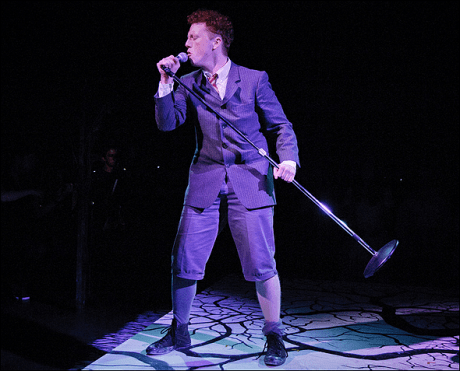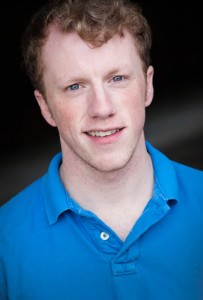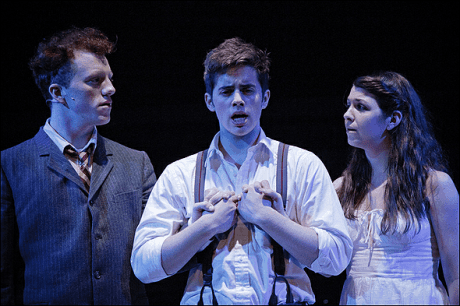This is Part 3 of my interviews with the cast of Spring Awakening at The Keegan Theatre.
Paul Scanlan’s performance in Spring Awakening is astounding. When I attended the show I was in the front row and I could see the pain on Paul’s face grow and grow as his character’s suffering increased. I have been a fan of the show since I first sat on the stage at The Atlantic Theater in July 2006, and was mesmerized by this powerful musical. I have seen several productions of the show and different actors play Paul’s role, but rarely have I seen the intensity and energy that I saw in Paul’s interpretation and performance. I will never forget it!
I hope that all of you reading this interview will buy tickets to see Spring Awakening at The Keegan Theatre before it ends its run on July 8th. You, too, will never forget it!

Joel: Paul, why did you want to appear in Spring Awakening?
Paul: I saw the show in New York back in 2007 and went through a couple phases of listening to the cast recording over and over again. Besides the incredible lighting, the show had a really different feel and structure than anything I had seen before. I didn’t want to pass up a chance to be a part of this show, much less the regional premiere of it.
Introduce us to your character.
I play Moritz Stiefel, a psychologically disturbed and sexually confused teenager. He struggles to make sense of the changes happening to him, and relies on his best friend Melchior to help him through it.
Is there anything similar between you and Moritz?
I don’t think Moritz is similar to me at all. Luckily I was able to deal with puberty in a normal fashion. Good thing there are therapists and the internet to help kids get through things like that these days.
What challenges have you faced playing Moritz, and how did you overcome these challenges?
I think sometimes, especially with this show, playing the overlying emotion of a scene or song can be the easiest and most obvious choice. I wanted to make sure that didn’t happen. Because the lyrics are more poetic than literal within the context of the scenes, the intent has to be even more strong. I also found out how to let myself loose and be able to rock out at certain parts. I believe Moritz truly finds his voice in his songs and is able to express without fear of reprisal. Our choreographer Kurt really helped me find that rock persona, especially in “Don’t Do Sadness”
Steven Sater and Duncan Sheik’s score is so beautiful and powerful. What is it about the score that moves you?

Besides the fact that the score is very catchy, the lyrics are almost poems. Certain songs work so well to capture the feeling of the scene, where as other songs transport the characters to different places in their psyches and bring out their desires or deepest secrets.
The score allows your character to ‘speak out’ and express his inner feelings. Tell me about your songs that allow you to do that.
“And Then There Were None” Moritz has just found out that he failed the final exams at school, and will not be promoted to the next grade. In an act of desperation, he writes to Melchior’s mother and asks for help. That song is her letter back to him, and his response. It’s one of my favorite songs to sing in the show, because the song actually has a through-line, where each verse is set up by the preceding section of the letter.
“Don’t Do Sadness” occurs in the second act, and eventually becomes a duet with the character Ilse. The first section of the song is basically a giant middle finger that Moritz raises to everyone, telling them that nothing is going to affect him, and that is when the rock star in him really shines. The second half follows the first melodically, obviously with different lyrics, but you can see Mortiz breaking down and not being able to convince himself that he will be alright any more.
How did Directors Mark and Susan Rhea help you develop and mold your performance?
Mark and Susan have been so generous with their visions of the characters working with our visions. I can’t remember a single time we came into conflict over some aspect of the character or show. They set a tone and a goal for each scene, and were very liberal in letting us have time to find many options on how to get there before tweaking things.
What have you learned about yourself as an actor working on Spring Awakening?
I learned that I absolutely loathe dying my hair, for one thing. As far as the show goes, with every character I play comes new knowledge and new experience. I have had many little mishaps happen during the process, such as dropping a prop or two, blanking on a lyric during a song, etc. As embarrassing as these things can be, what I’ve told myself is to never EVER let it take me out of the moment. It happened, I accept it as part of the story, and I find I way to justify my resulting actions. If I can take away something from this show, it will be that I always followed my instincts and never judged myself if I felt I wasn’t reaching certain points during the night.
How can today’s audiences of all ages relate to the lessons and themes of Spring Awakening?
Whether we as an audience experienced what these characters did first-hand or not, we may know somebody who did. These are kids discovering themselves. I read a comic somewhere that reads something to the extent of “when we are young, we are taught to speak and how to stand up and walk. When we grow up, we are told to sit down and shut up.” Please excuse me if I paraphrased that. I really like that as a sort of parallel to the show. The tragedy in this show is that the characters want to know nothing more than their human nature, and their innocence is rewarded with harsh consequences.
What do you want audiences to take away with them after seeing Spring Awakening?
Regardless of whether or not the subject matter in the show offends you, I think most people can count on nodding their heads to the tune of some of the songs in the show.

Spring Awakening plays through July 8, 2012 at The Keegan Theatre at Church Street Theater – 1742 Church St, NW, in Washington, DC. For tickets, call (703) 892-0202, or order them online.
LINKS
An interview with Vincent Kempski (Melchior).
An interview with Lyndsay Rini (Anna).




